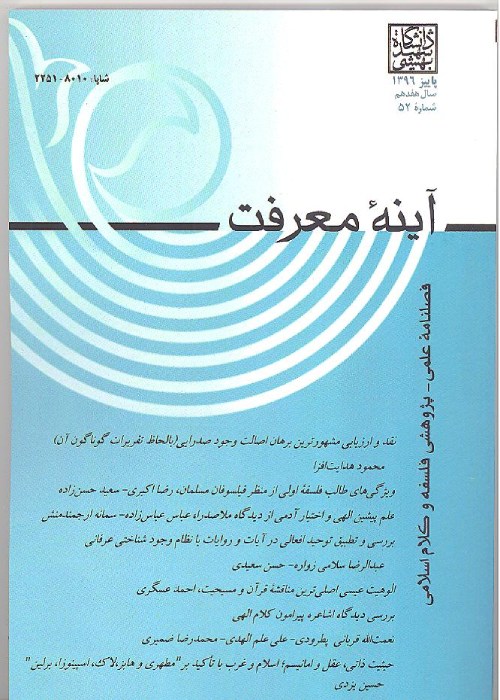Divine Foreknowledge and Human Freewill(With an Emphasis on the Viewpoint of the School of Âhl al-Bâyt (Peace be upon them) and Criticism of Rival Viewpoints)
In discussing on predetermination and freewill, especially from a religious viewpoint, the following questions arise: Does Divine Foreknowledge belong generally to all things and especially to the voluntary human actions? And if Divine Foreknowledge belong to the voluntary human actions, is this compatible with human freewill? In the Islamic thought, two groups have dealt with the problem of “predetermination and freewill”: Âshʹârītes and Mûʹtâzîlītes. The Âshʹârītes held in determinism and “the incompatibility of Divine Foreknowledge with human freewill”, but the Mûʹtâzîlītes held in indeterminism and “the compatibility of Divine Foreknowledge with human freewill”. According to the Mûʹtâzîlītes, the distinction between a human being and the inanimate things is in free action, and if Divine Foreknowledge is a hindrance to human freewill, a human being will not be able to do his actions freely, and so, there will be no difference between a human being and the inanimate things. This paper aims at rereading the problem of “the compatibility/ incompatibility of Divine Foreknowledge with human freewill” and tries to show that which viewpoint is true viewpoint: Determinism or Indeterminism or a viewpoint between them? In trying to do so, this paper intends to answer the following questions: Does God have foreknowledge to the acts of His servants? What are the characteristics of Divine Foreknowledge? If God has foreknowledge to the acts of His servants, what is the relation of His foreknowledge with human destiny and freewill? Is His foreknowledge a hindrance to human freewill? If Divine Foreknowledge is a kind of predestination, can human beings interfere in what happens for them or they have no way but mere submission? Undoubtedly, if these questions are not answered, some religious doctrines, such as the duties of human beings before God and their moral responsibility for their actions, will lost their validity. Although many papers have been written about the problem of “predetermination and freewill”, the difference between this paper and other papers is in the way of solving the problem.In this paper, at the first stage, the meaning of Divine Foreknowledge, its characteristics and its relation with human freewill are discussed. And, at the second stage, a detailed and precise discussion has been made about the viewpoint of the School of Âhl al-Bâyt (peace be upon them), entitled “Âmrûn Bâyn al-Âmrâyn”, which is a viewpoint between Determinism and Indeterminism. According to this viewpoint, Divine Foreknowledge is compatible with human freewill and isn’t a hindrance to human freewill. This viewpoint neither negates some religious doctrines, such as a human being’s duties before God and his moral responsibility for his actions, nor limits the Divine Omnipotence in favor of human freewill.Moreover, in response to the historical problem of “predestination and freewill” in Islamic thought, this viewpoint proposes a third position between Determinism and Indeterminism, which is known as “Âmrûn Bâyn al-Âmrâyn”. This position explains the human agency by relying on human ability to do actions and the sovereignty of God’s Will. According to this position, by acquiring the power from God, a human being becomes able to do actions before doing them, and on the basis of this power, he wills and acts. At the same time, by acquiring this power from God, Divine Omnipotence isn’t limited, and nothing can happen without God’s Will, and if God’s Will doesn’t belong to do something, no one can overcome His will.
- حق عضویت دریافتی صرف حمایت از نشریات عضو و نگهداری، تکمیل و توسعه مگیران میشود.
- پرداخت حق اشتراک و دانلود مقالات اجازه بازنشر آن در سایر رسانههای چاپی و دیجیتال را به کاربر نمیدهد.


